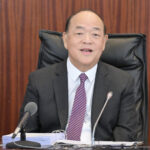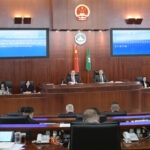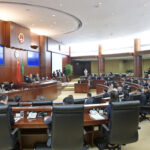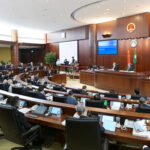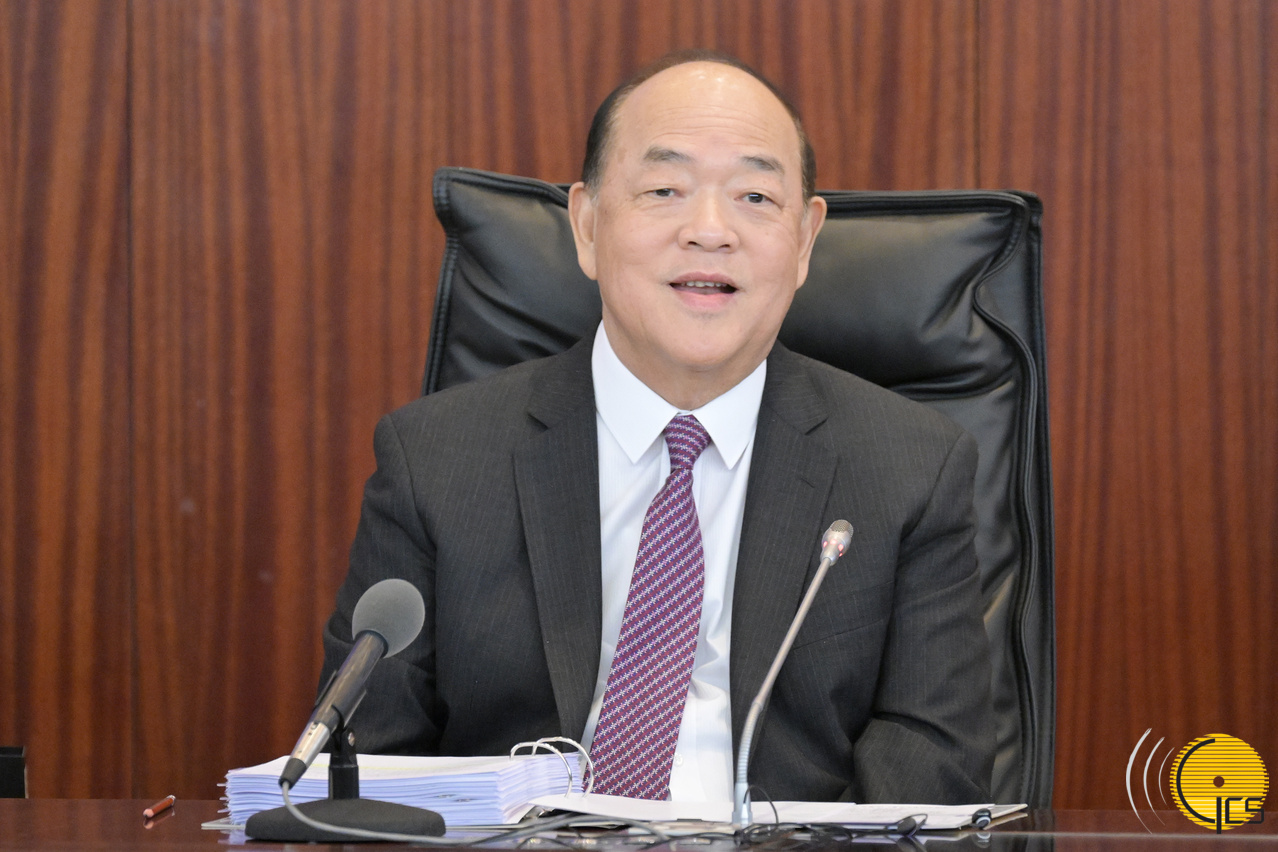 The Chief Executive, Mr Ho Iat Seng, attends a plenary session of the Legislative Assembly to answer questions raised by Legislative Assembly members concerning the Policy Address for the Fiscal Year 2024.
The Chief Executive, Mr Ho Iat Seng, attends a plenary session of the Legislative Assembly to answer questions raised by Legislative Assembly members concerning the Policy Address for the Fiscal Year 2024.
The Chief Executive, Mr Ho Iat Seng, was in the Legislative Assembly on Wednesday (15 November) to answer legislators’ questions regarding the Policy Address for the Fiscal Year 2024. During the session, 31 members raised questions, most of which related to people's livelihoods, including matters affecting the elderly, incentives for people to have more children, medical and health matters, urban planning, and transportation. Mr Ho gave a response to all of the questions.
Regarding questions from lawmakers about care for the elderly and the growing proportion of older people in the population, Mr Ho said that – as of the end of December last year – people aged 65 or above accounted for 13.3 percent of the total population in Macao. That was in the middle of the range relative to neighbouring regions. The Government would continue to pay close attention to the situation regarding the general ageing of the population, while also strengthening social security and other services. Every year, the Government reviewed and evaluated – via an existing mechanism – whether there were conditions for adjustment in pensions paid to the elderly. According to this year's indicators so far, the conditions for any adjustment in pensions had not been reached. If the relevant conditions occur, pensions would definitely be raised, the Chief Executive stated.
Mr Ho said that taking account of the housing needs of senior citizens, the Government would step up the construction of care home accommodation in New Urban Zone Area A, in order to provide over 900 beds. In addition, the public application process for housing units in a complex specially built for elderly people had already started. The Government hoped to provide more housing options and protection for the elderly. Meanwhile, the Government had been encouraging the elderly to find employment that were within their capabilities, by means including increasing to 198,000 patacas the professional tax exemption for employees over 65 years old. Mr Ho hoped that all sectors of society would be open-minded and jointly support and accept the employment of the elderly.
In terms of encouraging a higher birth rate, Mr Ho said that the Government had in recent years amended relevant legislation, to increase the amount of maternity leave, establish paternity leave, and increase child-allowance payments. It hoped to bring the birth rate back to normal levels through a number of measures. At this stage, there was no research that indicated a need to adjust maternity leave; issues such as women’s employment situation and the affordability of parental leave for small and medium-sized enterprises had to be comprehensively considered. Low birth rates were a global problem. The Government would continue to pay attention to the issue, and commission professional organisations to conduct research.
In response to questions about optimising the healthcare and medical systems, Mr Ho said that part of the Islands District Medical Complex - Macao Medical Centre of Peking Union Medical College Hospital would begin a trial period for services in December this year. There would be a three-level system for service charges: the first level was for Macao residents who are currently entitled to free medical care. If referred by the Health Bureau to Macao Medical Centre of Peking Union Medical College Hospital, they would be able to benefit from free medical treatment there. An example was if Conde S. Januário Hospital lacked the equipment needed for treating a certain kind of tumour, patients could be referred to the new hospital. The second level of charges was for those Macao residents referred by the Health Bureau but who were not entitled to free medical care. In this situation, fees deemed to be reasonable would be applied. The third level was for high-end private medical services, and the fees would be based on market rates for such services. Mr Ho emphasised that the Macao Medical Centre of Peking Union Medical College Hospital would provide services centred around, and based on, supporting the well-being of Macao residents: they would not need to worry about cost. The free medical care Macao residents currently enjoy would be maintained, he said.
Regarding zoning under Macao's urban planning system, Mr Ho said that details for Eastern District-2 would be announced after preparatory work had been completed at the end of this year. Detailed drafting of plans relating to Outer Harbour District-1, Outer Harbour District-2, Northern District-1, and Taipa Central District-2 would be continued into next year. Macao’s Urban Master Plan proposed to divide Macao into 18 districts, and the preparation of each district plan must be carried out in an orderly manner, the Chief Executive said. The main purpose of preparing detailed zoning plans was in order better to plan the ratio of population to available space in each zone. For instance, the population should not be permitted to increase in high-density zones. In addition, Mr Ho noted that if industrial buildings were revitalised and converted to residential use, the population density in the respective zone would increase, and the quality of life for the existing inhabitants would be affected. Furthermore, under the provisions of the Land Law, the land contract provisions must be followed. Industrial buildings in industrial zones were more suitable for revitalisation for industrial purposes. For example, the height restriction of facilities in Concordia Industrial Park could be relaxed to increase the land-to-building ratio.
Regarding the pricing of Home-Ownership Scheme housing units, Mr Ho said that the relevant legislation stipulated that the selling price of a unit was composed of the land grant premium, construction costs, and administrative costs: there was no profit margin. He said that the bid evaluation for construction of the five Home-Ownership Scheme housing projects projected for New Urban Zone Area A would be completed soon. After the construction costs were determined, the Government would uniformly price the housing units with reference to the median unit cost. It was expected such pricing would be announced early next year.
Regarding public transportation planning, Mr Ho stated that the Government was promoting a ‘bus + light rail’ mode for the city’s transportation network, and plans to build more ‘sky corridors’ in suitable locations, so that the light rail, bus, and pedestrian systems form a rationally-configured three-dimensional traffic network. The transportation network arrangements would complement each other, thereby improving the capacity and efficiency of Macao’s overall transportation system.


